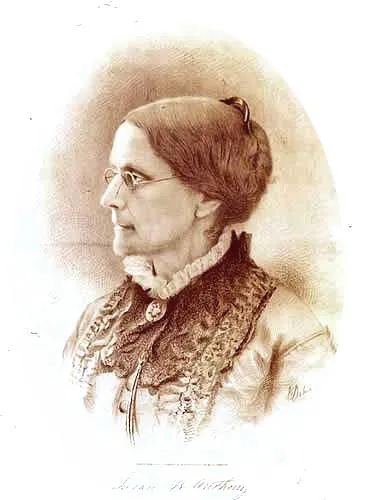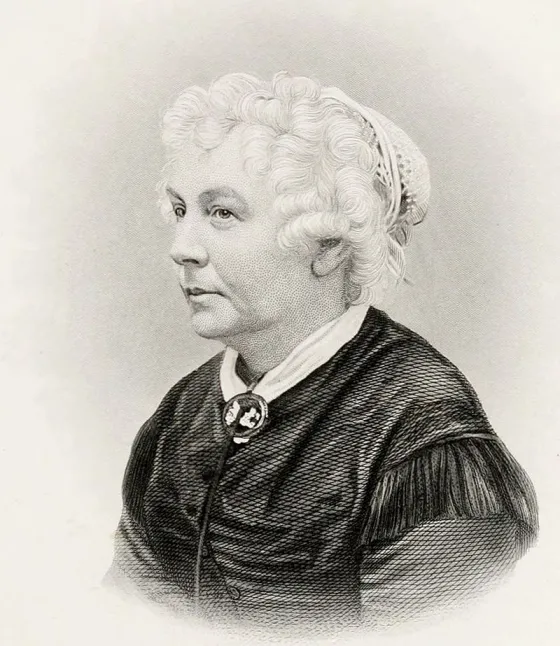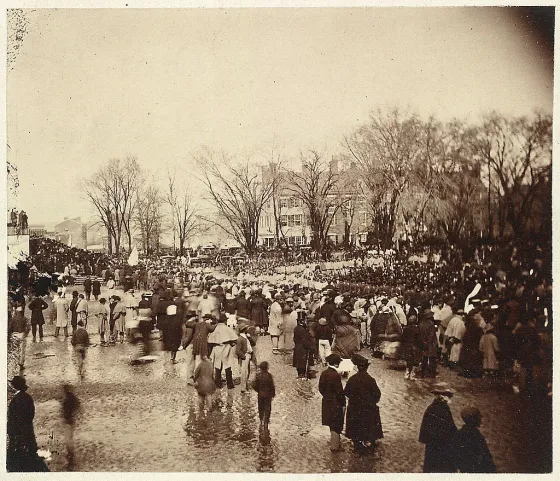
Grand Reception at Lincoln's Second Inauguration
The Civil War was a time of unrest and change, and despite not being able to vote, women played critical roles in influencing the election and contributed to the war effort. Some women went to the frontlines as nurses and soldiers. Others formed organizations to support abolition. Many women took on additional responsibilities on the home front and took care of family farms and businesses. However, one of the most significant changes for northern women was their increased political engagement during the 1864 election, when General George McClellan ran against incumbent President Abraham Lincoln. Throughout the contentious election, women were seen at the forefront participating in political discussions, attending rallies, and voicing public support for candidates—though not allowed to vote.
Before the Civil War, approximately 300 men and women had organized in Seneca Falls to discuss gender inequality and women’s suffrage. This convention was the beginning of advocacy for the women’s right to vote in the United States, but the Civil War interrupted the efforts. Many organizers for women's suffrage also supported the abolition cause and focused their attention on ending slavery and restoring the unity of the country during the war years from 1861-1865.

In May 1863, Susan B. Anthony and Elizabeth Cady Stanton created the Women’s National Loyal League, which had a goal of ending the Civil War with a constitutional amendment that abolished slavery. This organization had 5,000 members, and a large portion of the members were suffragists focused on the Union war effort. After the 13th Amendment passed in 1865, the league disbanded, and women went back to fighting for suffrage. Elizabeth Cady Stanton also used her influence as a leader in the Women’s National Loyal League to organize during the election of 1864 for the Radical Democracy party. Stanton tried to elect John C. Fremont under the platform of adopting an amendment to abolish slavery and authorizing an amendment to ensure equal protection, but he did not become a major party candidate.

Women's increased political activity during the 1864 election are sometimes evident in letter collections. For example, Frederic and Elizabeth Lockley lived in upstate New York. During the Civil War, Frederic Lockley enlisted in the 113th New York Infantry Regiment, and he and his wife corresponded regularly.
On September 18, 1864, Elizabeth Lockley shared her opinions with her husband on the upcoming election in a letter: “I think [Lincoln ] will be reelected. I trust so, for I think he has shown that [he] will do what is best for the interests of our country. I fear McClellan is to[o] easily led. Has not the stability nor punctuality enough for the position, tis said that [Lincoln] is not dignified enough, that may be so, but we will gladly put up with his lack of dignity if he will only guide our back safely through these [troublous] times." Even though Elizabeth could not vote, she observed the political affairs of the United States, and she shared her original opinions on how she felt the election would unfold. In response to a series of letters where Elizabeth shared her thoughts on the election, on October 13, 1864 Frederic noted, “You seem to be growing quite a politician. Which ticket are you going to vote?"
Not only was Elizabeth writing to her husband about the election and sharing her opinions on the candidates, but she also attended political meetings at Tweddle Hall. Tweddle Hall was at the forefront of civic life in Albany, and Elizabeth attended multiple Union-supporting meetings in that building. She recalls that these meetings were attended by “most respectable class of citizens both men and women. The intelligent[,] the noble and the patriotic." Elizabeth also was particularly drawn to a speech from Massachusetts Governor John Albion Andrew where he denounced the Peace Democrats and compared the platforms of the Republican and Democratic parties. Elizabeth even claimed attending these informative political meetings at Tweddle Hall made her feel “almost like voting myself."
The letters between Frederic and Elizabeth Lockley make evident that the election of 1864 was a new era for women's political interest. Elizabeth was not the only woman attending these meetings, and she mentions other women who accompanied her at the meetings. Even though none of these women could vote, their involvement in politics was crucial, and their participation added women to the conversation.

Another young woman—Mary Emma Randolph—wrote letters about her political activities to her fiancé, Private Walter G. Dunn. Emma attended political meetings at the Wigwam, which was a political headquarters for the Republican Party in New Jersey. Going against her mother’s wishes, she went to these meetings to hear lectures from speakers like Elder Rogers and Colonel Montgomery and heard about the current political state of the United States as the election neared. Emma also observed other women voicing their opinions on the election in other public spaces where she saw a “couple of women in the store talking up for ‘Little Mac,’” who was as Democratic Party candidate George McClellan.
Emma witnessed the excitement of election all around her, and her engagement with the New Jersey Republican party inspired her to have meaningful discussions with her fiancé about how he would vote in the election. In her letters, she encouraged him to exercise his civic duty to vote. He frequently wrote back about conversations he had with his fellow soldiers about the election. Rather than just dismissing Emma because she was not a voter, Walter Dunn included her in the conversation and seemed to value her opinions.
The Election of 1864 part of the long journey towards suffrage, which women finally achieved when the 19th Amendment to the U.S. Constitution was passed in 1919 and ratified in 1920. Women’s contributions to the Civil War effort and the home front, allowed women to contribute to American society in a way like never before. These stories about women’s increased political activity highlights how the Election of 1864 was a turning point for women.
Further Reading:
Judith Bailey. After Chancellorsville, Letters from the Heart: The Civil War Letters of Private Walter G. Dunn & Emma Randolph. The Maryland Center for History and Culture, 1998.
Frederic and Elizabeth Lockley; Charles Rankin, editor. Toward a More Perfect Union: The Civil War Letters of Frederic and Elizabeth Lockley. University of Nebraska Press, 2023.





